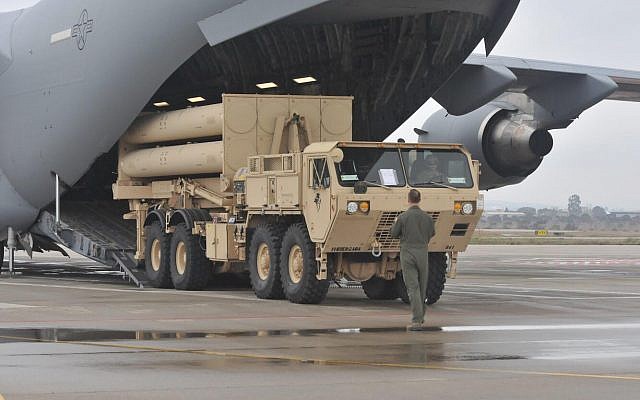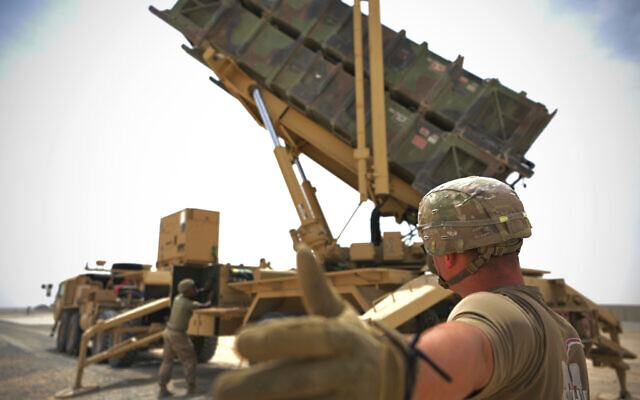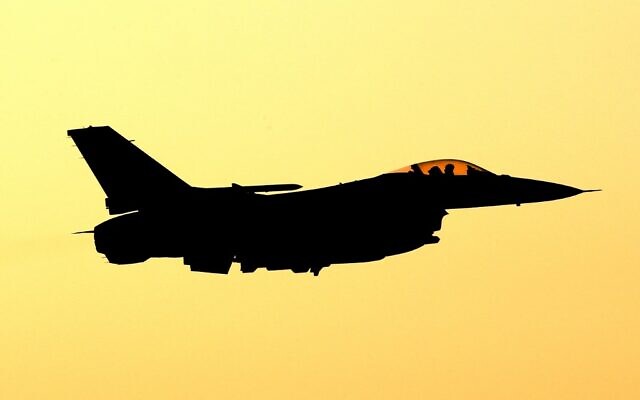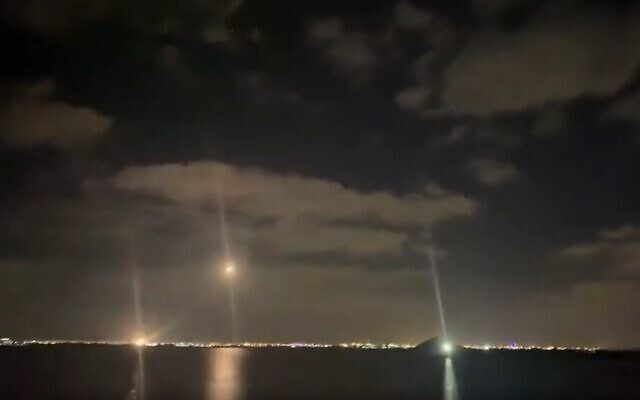Pentagon says deals will help bolster regional partners while countering Iran and other hostile actors, amid flurry of drone and missile attacks blamed on rebels in Yemen, Iraq
By TOI STAFF

A THAAD missile defense system. (US Army Europe)
The US State Department approved potential sales of fighter jets and air defense systems to Jordan, Saudi Arabia and the United Arab Emirates to help stabilize the region and counter Iran, Washington said Thursday.
The proposed sales include fighter jets, munitions and other equipment for Amman, with a price tag of $4.21 billion; $23.7 million in upgrades to Saudi Arabia’s missile defense systems; and $65 million in spare parts for missile defense systems deployed by the UAE, according to the US Defense Department, which announced the approvals.
None of the sales will alter the military balance in the region, the Defense Security Cooperation Agency said, a determination meant to assure Congress that Israel’s qualitative military edge in the Middle East would be maintained.
The UAE has been targeted several times in recent weeks by attack drones and missiles thought to have been launched by Iran-backed militias in Yemen. US and Emirati forces jointly intercepted two recent aerial attacks, including one earlier this week as Israeli President Isaac Herzog began a historic visit to the Gulf Arab country.
Saudi Arabia has also been a frequent target of drones and missiles from Yemen’s Houthi rebels, who have been battling a Saudi-led coalition as part of Yemen’s seven-year civil war.
On Wednesday, the Emirates said it intercepted attack drones later claimed by an Iran-backed group in Iraq that has previously targeted Saudi Arabia.

Illustrative — US soldiers near a Patriot missile battery at Al-Dhafra Air Base in Abu Dhabi, United Arab Emirates, May 5, 2021
(Staff Sgt. Jao’Torey Johnson/US Air Force via AP)
The Pentagon said it could sell 31 MIDS-LVT data link systems to upgrade Riyadh’s THAAD air defense platforms, supplementing similar systems already installed on its Patriot missile defense array.
“The proposed sale will provide the Saudi armed forces with the equipment, training, and follow-on support necessary to protect Saudi Arabia, and the region, from the destabilizing effects of terrorism, countering Iranian influence, and other threats,” the Pentagon said in a notice to Congress.
The Defense Department said it had approved upping UAE acquisitions of spare parts for its Patriot, THAAD and HAWK air defense systems from $30 million, which had been previously approved, to $65 million.
The sale will support “maintaining the operational readiness of critical air defense systems,” the Pentagon said.
Jordan was given the go-ahead to purchase 16 F-16 Block 70 aircraft, along with related equipment and hundreds of various Joint Direct Attack Munition tail kits to upgrade its munitions.

A US F-16 fighter jet takes part in the “Blue Flag” multinational air defense exercise at the Ovda air force base, north of the Israeli city of Eilat, on November 11, 2019. (Jack Guez/AFP)
The Defense Department said the sale would modernize Jordan’s air force and support the goals of the US-led regional coalition “such as countering violent extremist organizations, countering malign state and non-state actors, and border defense.”
The announcements are required by law before a possible sale. The statements indicated that the deals had yet to be finalized.
US officials have scrambled in recent days to assure Gulf strategic allies, including Saudi Arabia and the UAE, of US defensive support.

Interceptors are launched over Abu Dhabi in the United Arab Emirates to hit incoming missiles, January 24, 2022. (video screenshot)
“America will have the backs of our friends in the region,” US President Joe Biden told reporters after a drone attack on Monday.
The Biden administration has appeared reluctant to sell offensive weapons to the Saudis, who are accused of human rights abuses during its long engagement in Yemen’s civil war. The Houthis and the UAE, which withdrew forces from the conflict in 2019 but have continued to back anti-Houthi rebels, have also been accused of abuses.
The Pentagon said it could sell 31 MIDS-LVT data link systems to upgrade Riyadh’s THAAD air defense platforms, supplementing similar systems already installed on its Patriot missile defense array.
“The proposed sale will provide the Saudi armed forces with the equipment, training, and follow-on support necessary to protect Saudi Arabia, and the region, from the destabilizing effects of terrorism, countering Iranian influence, and other threats,” the Pentagon said in a notice to Congress.
The Defense Department said it had approved upping UAE acquisitions of spare parts for its Patriot, THAAD and HAWK air defense systems from $30 million, which had been previously approved, to $65 million.
The sale will support “maintaining the operational readiness of critical air defense systems,” the Pentagon said.
Jordan was given the go-ahead to purchase 16 F-16 Block 70 aircraft, along with related equipment and hundreds of various Joint Direct Attack Munition tail kits to upgrade its munitions.

A US F-16 fighter jet takes part in the “Blue Flag” multinational air defense exercise at the Ovda air force base, north of the Israeli city of Eilat, on November 11, 2019. (Jack Guez/AFP)
The Defense Department said the sale would modernize Jordan’s air force and support the goals of the US-led regional coalition “such as countering violent extremist organizations, countering malign state and non-state actors, and border defense.”
The announcements are required by law before a possible sale. The statements indicated that the deals had yet to be finalized.
US officials have scrambled in recent days to assure Gulf strategic allies, including Saudi Arabia and the UAE, of US defensive support.

Interceptors are launched over Abu Dhabi in the United Arab Emirates to hit incoming missiles, January 24, 2022. (video screenshot)
“America will have the backs of our friends in the region,” US President Joe Biden told reporters after a drone attack on Monday.
The Biden administration has appeared reluctant to sell offensive weapons to the Saudis, who are accused of human rights abuses during its long engagement in Yemen’s civil war. The Houthis and the UAE, which withdrew forces from the conflict in 2019 but have continued to back anti-Houthi rebels, have also been accused of abuses.
No comments:
Post a Comment